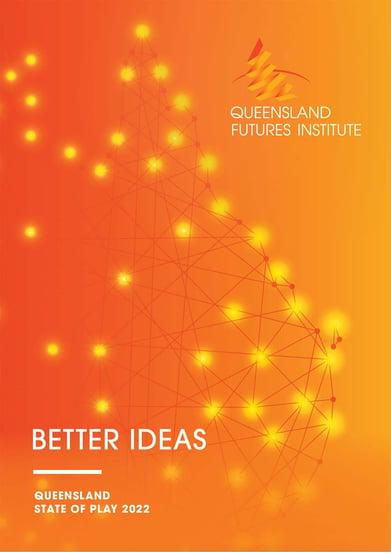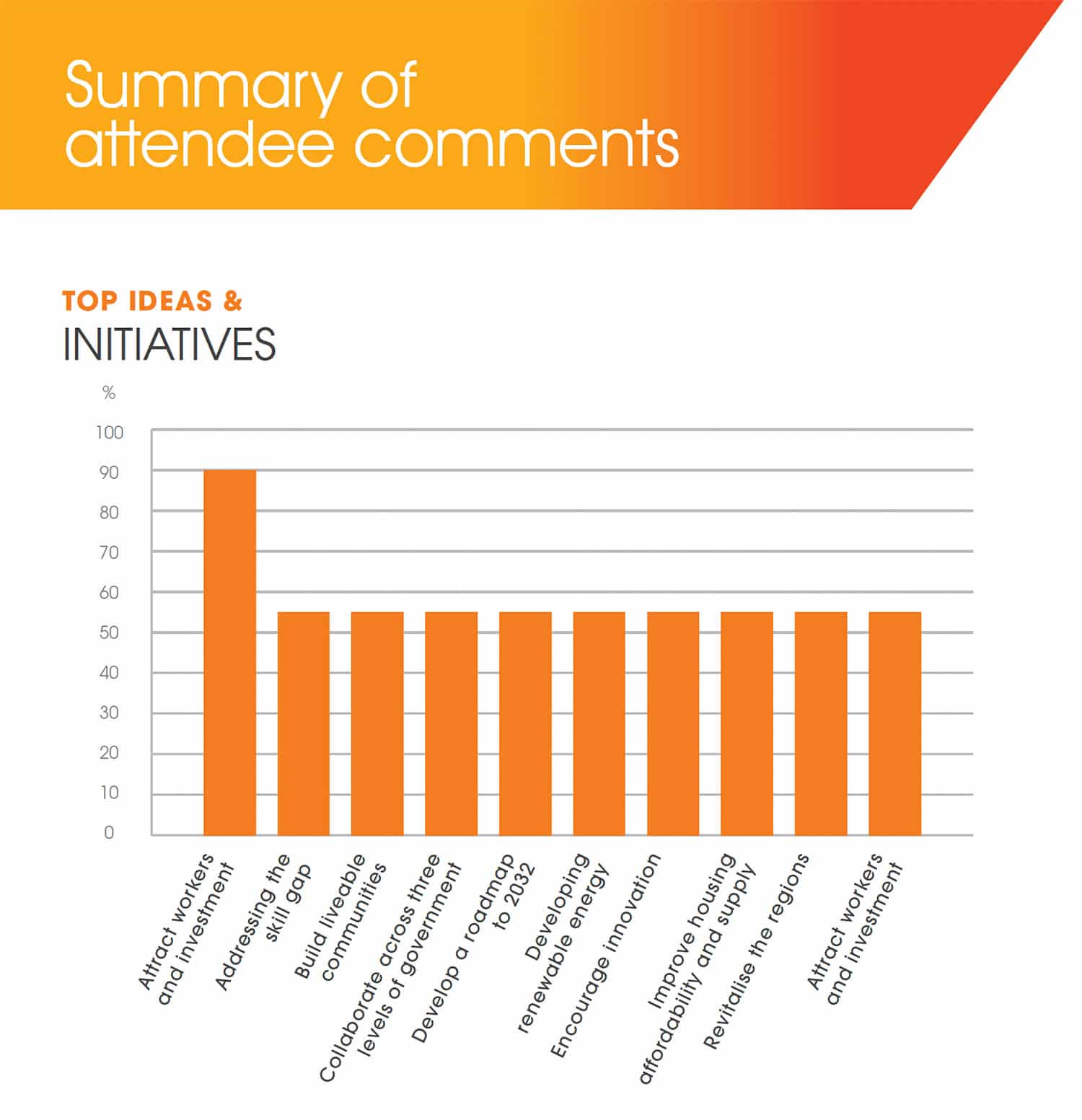| Ahead of the looming Federal Election, the Queensland Futures Institute’s ‘Queensland’s State of Play 2022’ forum highlighted priority investment, planning and innovation targets across multiple industries in order for the State to reach its future potential. All parties reinforced the need for mature collaboration between industry and all three levels of government to deliver the required investment and economic outcomes for Queensland leading up to the 2032 Olympics and beyond. The discussion considered the need for a master plan to outline gaps and opportunities for Queensland communities and identified housing and infrastructure needed to support a growing population as key areas to be addressed. If these can be addressed in the years before the Games, Queensland will create a lasting legacy and effectively showcase the region as a major drawcard for long-term international tourism, education and investment. |
 |
Panelists |
|
|
 |
 |
 |
| Rebecca Andrews
Head – Queensland
Australian Industry Group |
Andrew Barger
Policy Director Economics
Queensland Resources Council |
Heidi Copper
Chief Executive Officer
Chamber of Commerce & Industry Queensland |
 |
 |
 |
| Daniel Gschwind
Chief Executive Officer
Queensland Tourism Industry Council 
Jen Williams
Queensland Executive Director
Property Council of Australia |
Priscilla Radice
Chief Executive Officer
Infrastructure Association
of Queensland

Moderator Prof. Brent Richie
Academic Dean
Head of School UQ Business School |
Alison Smith
Chief Executive Officer
Local Government Association of Queensland |
QFI thanks its sponsor The University of Queensland Australia

QFI thanks its sponsors |
|

|

|
Platinum Sponsor |
Silver Sponsor |
Question 1: Can you please outline your priorities for the upcoming election and how it will impact your members and sector?
 |
Rebecca Andrews, Head – Queensland, Australian Industry Group
- The Australian Industry Group is a national, non-partisan organisation which helps to facilitate engagement across its membership. It has recently released 14 policy recommendations which address the immediate and longer-term needs of industry.
- These recommendations are summarised in seven key policy areas including: skills development, education and training; workplace relations; developing Australian industry, energy, climate and the environment; taxation intergovernmental relations; skilled migration and pandemic preparedness.
- The economic recovery following the pandemic will be the focus of the next Parliament. Part of this includes ensuring industry is robust enough to handle challenges such as the current supply chain issues.
- Ensuring the strength of industry will be achieved through inclusive practises, attracting a highly skilled and diverse workforce and innovation. This will particularly benefit SMEs.
|
 |
Andrew Barger, Policy Director, Economics, Queensland Resources Council
- Queensland Resources Council is the peak body for mining and energy in Queensland. The industry will be a focus of the upcoming Federal election.
- To achieve positive outcomes, there is a strong need to depoliticise the issues discussed, to facilitate upskilling and training to attract and retain a highly skilled workforce – this is particularly important as renewables, hydrogen and digital developments occur – and to make movements towards reconciliation, which could be achieved through the Uluru statement.
|
 |
Heidi Cooper, Chief Executive Officer, Chamber of Commerce and Industry Queensland
- The Chamber of Commerce reflects the sentiment of 450,000 businesses across Queensland and understands their needs and what industry more broadly needs to grow.
- Collaboration between all levels of government and supportive business environment will be required to address current and future challenges around workforce and dealing with climate change.
- The compounding of these challenges must be addressed to move forward and adapt, and to benefit from future opportunities.
- We must leverage initiatives and future opportunities such as the Olympics to bolster business growth, transform the economy and achieve prosperity over the next decade.
|
 |
Daniel Gschwind, Chief Executive Officer, Queensland Tourism Industry Council
- Tangible outcomes should remain the focus for industry throughout the election campaign and this may require collaboration across the political divide.
- A key consideration for Queensland Tourism Industry Council is skills and workforce. This involves attracting and retaining a skilled workforce, providing additional upskilling and training as needed.
- Through the pandemic, the sector likely lost approximately 500,000 workers over two years. There is clearly a need to encourage international students, working holiday visa holder’s to recover from this loss. This is a key input to the Queensland economy and must therefore be addressed in order to move forward.
- Liability and property insurance is also a significant challenge for the industry. This is currently leading to business closures and is stymying business development. Government must address this to facilitate business growth as this is too large a challenge for businesses to solve alone.
- Crisis management and robustness is also a key area which business can develop to accelerate their momentum forward.
|
 |
Priscilla Radice, Chief Executive Officer, Infrastructure Association of Queensland
- The Infrastructure Association of Queensland has a broad membership of recruitment agencies, engagement firms, legal, accounting, advisory, engineering and construction firms. The current focus is building on better outcomes and driving transformation to catalyse a step change to growth.
- This requires collaboration across all levels of government and must be holistic rather than driven by specific issues or projects.
- Better transparency around investment decision making is also needed to understand the drivers of social and economic outcomes across energy, water security, education, digital, health, and transport. Economic development should not be driven on a project-by-project basis but must be coordinated across these areas.
- We must also acknowledge the risks around climate change and plan for resiliency. This can be achieved with resilient infrastructure, which Federal government has a role to encourage and develop; more policy direction around decarbonisation is needed.
- There is also a large opportunity in the lead up to the Olympics to develop a reformagenda to encourage migration, population growth and workforce participation.If this is effectively achieved, there will be significant gains in diversity,innovation, and productivity.
|
 |
Alison Smith, Chief Executive Officer, Local Government Association of Queensland
- LGAQ represents 77 LGAs across Queensland and will play an important role in theupcoming Federal election. This is an opportunity to hone messaging around what isbest for Queensland communities and advocate for this in election outcomes andcommitments.
- LGAQ priorities consider local engagement and aim to improve the liveability ofQueensland communities, developing social services and infrastructure to improve socialoutcomes.
- While there is funding from State and Federal government to achieve this, it is delivered ona local level; local governments must therefore be prepared to work with different levels ofgovernment to deliver the intended outcomes of these funding programs. This should be afocus for the election across all Queensland communities.
- Two examples of outcomes critical to many communities is ensuring adequate disasterrelief and mitigation, as well as housing affordability. These must both be supported byadequate infrastructure and planning.
- Housing affordability and liveability is an issue across the country. 11 peak bodies in thehousing industry have recently come together to address both affordability and supplyand call for a national housing summit. This will require multiple stakeholders across industryand government to come together and deliver for many local communities.
|
 |
Jen Williams, Queensland Executive Director, Property Council of Australia
- The Property Council of Australia is the preeminent property industry body which bringstogether owners, managers and developers amongst their broad membership base.
- Housing affordability is one of the top issues going into the election, with local councilsplaying a large role in delivery and planning with the assistance of State and Federalgovernment through funding.
- There is also need for planning around the increased population we will see in the comingyears. While accommodation is a large part of this, skills development and attracting ahighly skilled workforce is also required; international students must be attracted to andretained in Queensland. In addition to population inflows, we must also attract foreigninvestment and remove roadblocks to these inflows.
- Capital cities are critical to the economic development of Queensland. CBDs have beenchallenged and under pressure during the pandemic and must now be leveraged toattract tourists and workers and stimulate local businesses. More support from Federalgovernment is needed to attract both local workers and tourists.
|
Question 2: Other than your election focus, would you outline your key opportunities and challenges for your sector over the next 12 months?
 |
Jen Williams, Queensland Executive Director, Property Council of Australia
- In Queensland, we have opportunity in the lead up to the Olympics to drive economicdevelopment and social outcomes by improving the health system and supportinggreenfield housing development to support a growing population.
- There are significant headwinds in the property industry partially driven by skills shortagesand supply chain issues impacting timeliness of delivery and resulting in developersand builders going into administration. This will remain a challenge and stymie thedevelopment of housing, delaying any easing of affordability issues.
|
 |
Alison Smith, Chief Executive Officer, Local Government Association of Queensland
- There are massive opportunities across Queensland – both in metropolitan and regional areas – to improve community standards and liveability.
- The main challenge is housing and skill shortages, particularly in regional communities. This is widely recognised and should be addressed with innovativeness around job creation in the regions.
|
 |
Priscilla Radice, Chief Executive Officer, Infrastructure Association of Queensland
- There are many opportunities to develop infrastructure in the lead up to the Olympics. Property industry growth is likely to drive this development.
- There is a focus on improving innovation and productivity through infrastructure development and this will only be achieved with strategic planning to achieve timely and efficient delivery whilst addressing current gaps and challenges such as land planning issues, and transportation.
- Property, land use and transport planning need to be undertaken holistically – rather than on a project-by-project, or sector-by-sector basis – to drive efficient economic development. Therefore, a master plan is required is deliver this articulated vision and capture community support.
|
 |
Daniel Gschwind, Chief Executive Officer, Queensland Tourism Industry Council
- We must build on Queensland’s competitive advantage as a clean, safe, spacious and temperate location for tourists. This is pertinent in the lead up to the Olympics and can highlight opportunities to not only tourists but also international investors, businesses and students.
- A collaborative vision across Queensland industry is required and the Olympics has provided an opportunity to unify businesses and government to benefit from this.
|
 |
Heidi Cooper, Chief Executive Officer, Chamber of Commerce and Industry Queensland
- Queensland businesses must employ sustainable business practices and be agile in order to take advantage of the opportunities they will face in the coming years.
- We must think about the benefits which can be derived from economic development for communities and figure out how we can drive innovation to improve outcomes for Queenslanders. This will be a driver of growth which will shape the way communities and the economy evolves as we approach the Olympics.
- We must also consider the legacy of the Olympics and the longer term benefits we would like to secure when they are over.
|
 |
Andrew Barger, Policy Director, Economics, Queensland Resources Council
- A 30-year Queensland energy plan will be released in the coming months and will outline the opportunities and challenges which will be faced as the state targets 50% renewables by 2030.
- Carbon neutrality will be challenging in the lead up to the Olympics; however, this is likely to spark conversations and new approaches to reaching this target. A path to carbon neutrality and 2032 must be the focus of the next 12 months.
- Having adequate regulatory frameworks is required to achieve an efficient business environment in which streamlined and targeted investment can be made. This is particularly true for energy – which needs to be delivered affordably to enable Queensland businesses.
- Additionally, if we can get this right, Queensland is well positioned to leverage existing industry strength in mining to deliver the materials useful in the development of renewable technologies such as batteries, as well as add value to the manufacturing supply chain.
- This requires leadership by the government and will be an opportunity to showcase ongoing investment opportunities in the lead up to the Olympics.
|
 |
Rebecca Andrews, Head – Queensland, Australian Industry Group
- Skills and labour shortage remains the key issue for Australian Industry Group. This extends beyond the skills gap and supply chain pressures currently faced and will be an ongoing concern in the future.
- Given this challenge and in the lead up to 2032, a master plan will enable industry to overcome challenges and deliver the necessary infrastructure and other economic benefits needed.
- We have the opportunity to use the Olympics to do more and become world leaders in addressing social justice problems such as equity, domestic violence, alcohol and drug abuse and improve disability support.
- If we use the next decade wisely, we can transform Queensland’s social services, infrastructure and lifestyle, and create a major global drawcard and selling point in the Olympics, delivering improved social services as the legacy of the Games.
|
Audience Questions
| |
Given the current political climate in Australia, particularly coming out of Covid, what is the reasoning for the perceived disparity between the Federal Government’s actions and the needs of Australians? Is there an obligation or opportunity for business industry leaders to drive change and enhance the Government’s policy agenda? Response
- Industry can do more and be more collaborative with local government. It can achieve this through employing social license and building implicit community support not only through projects but more generally in the work it does.
- Compromise may be required to achieve the best outcomes for communities. Industry can start a conversation in achieving the best outcomes for communities in a holistic way rather than achieving outcomes which are siloed by sector.
- Despite not having a national housing summit, industry built adequate pressure amongst businesses and communities for the Federal government to listen and recognise the challenges being faced. Queensland should make the most of the national influence it has to achieve outcomes for its communities.
- Queensland communities must bring their diversity of opinions together to inform how state development occurs. An example of how this can be achieved is through regional policy committees coming together and facilitating the business community to provide their voice and hear others to influence and understand industry and community needs.
- It is this community and industry voice which drive outcomes and influences legislation and politics. This must therefore be encouraged at all levels and facilitated by local and state government.
- Industry should better engage with the community in order to achieve alignment between the responsibilities and needs of individuals, communities, businesses and industries. This ultimately informs political debate.
- Governments are dealing with issues more slowly than businesses are. The ownership and accountability of problems needs to be improved in order to create positive change for communities, businesses and government. The trend of increasing transparency and accountability in business and government must continue to be encouraged.
|
| |
Compliance is a major challenge to unlocking economic value for industry. This is made harder in an increasingly difficult regulatory environment. Does local or state government have a role to play in overcoming this challenge? Response
- The business environment is becoming increasingly litigious. For regulated industries, compliance is increasingly becoming harder. This is certainly a challenge that must be addressed. Industry must come together to advocate and overcome this challenge with the help of State and Federal government.
|
| |
We are currently experiencing higher levels of debt which has the potential to threaten government budgets. What are the policy settings which could allow the private sector to fill this gap and deliver equitable outcomes in communities? Response
- We must see the private sector working with government to deliver the key public projects and deliver the required economic outcomes. In doing this, it is important to manage trust and community expectations through local government and industry engagement to achieve community acceptance of projects and development.
- Considering alternative funding and delivery models in order to access cheaper capital or improve the cost of project or infrastructure delivery is key in unlocking this value.
- Private investment must be unlocked via public spending in order to fund critical projects and deliver economic outcomes. This is required in critical areas such as social housing and education.
- State government involvement in an asset recycling fund could also provide value and encourage global, private investment in the key infrastructure, allowing access to capital for long-term infrastructure opportunities.
- Queensland does not currently have an adequate policy environment to support investment. Industry must be better engaged so government can set supportive policy settings which encourage rather than inhibit investment. To do this we must consider the whole of the supply chain, including government, industry and communities.
|
| 
|
Summary of Ideas
-
Outlining a master plan of the challenges and opportunities faced by each industry in the lead up to the Olympics would enable adequate planning needed to add value and maximise the benefit of the Games. This would be used to address the gaps identified such as housing, renewable energy, the skills gap and workforce and innovation
-
Collaboration between industry and all levels of government is also critical to achieving these outcomes and delivering liveable communities in the lead up to the Games.
-
Attracting international investment as well as workers and students will also be a key pillar supporting the Queensland economy and unlocking economic outcomes for the State.
|
border-color: #ffffff


























